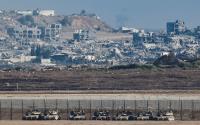15 November 2005Yahoo News / The ScotsmanJames Kirkup
Once, environmentalists adored Tony Blair, embracing the Prime Minister who said climate change was the greatest challenge facing humanity.
Yesterday, the love affair came to an end and, like so many break-ups, this one was marked by hard words, angry gestures and bitterness.
Mr Blair's retreat from his grand promises to tackle global warming has gone so far that not even New Labour's sultans of spin can disguise the growing gap between the Prime Minister's rhetoric and the reality. A leaked government study now admits that Britain is set to miss its targets for reducing emissions of carbon dioxide, the gas scientists blame for global warming.
Among the options set out in the paper from the Department of the Environment, Food and Rural Affairs is the suggestion that Britain could effectively pay other countries to cut their emissions and then count that reduction towards UK targets.
Under the market-based European Union Emissions Trading System, countries that pollute less than their treaty allowances can "sell" the shortfall to other nations.
The logic of the system is impeccable and ministers believe that buying spare capacity could well be the answer to closing what they admit is the gap between government targets and Britain's actual performance.
But politics is not driven solely by logic and the prospect of Britain effectively buying its way out of its international obligations is not an edifying one. Certainly, it is hard to reconcile with Mr Blair's grand environmental promises and looks suspiciously like a government trying to comply with the letter of the law on climate change while, frankly, not caring about the spirit of that law.
Just as so many other aspects of government policy have been reduced to presentational exercises, massaged figures, re-announced initiatives and, well, spin, so it looks as if the fate of our planet is going the same way.
Who cares if sea levels are rising, hurricanes becoming fiercer and deserts expanding? Mr Blair and ministers can find a way of proving the world is tackling that "greatest challenge".
It's tempting to compare the plan for emissions-trading to Enron's accounting: of course business is good, it says so on the balance sheet; never mind that the vault is empty.
The comparison with America's greatest corporate scandal is also handy, as more and more people suspect that Mr Blair has made a more fundamental departure in his attitude to climate-change policy, taking him much closer to George Bush, the US president, who made his fortune from oil.
At issue is what the world should do after the Kyoto Protocol expires. The 1997 treaty is the broadest-ever attempt to cut greenhouse gases. Britain's target, to be reached by 2012, is to cut emissions by 12.5 per cent from what they were in 1990.
Although it has been accepted by more than 150 countries around the world, the Kyoto Protocol has never been accepted by the biggest global polluter, the US, or the fastest-growing producer, China. As a result, Mr Blair says, a change is necessary when leaders decide what, if any, rules they should put in place after Kyoto expires in 2012.
So since the optimism of Gleneagles, Mr Blair has effectively ditched any idea that post-Kyoto deals should contain explicit targets for emission cuts.
In a keynote foreign policy speech at the Lord Mayor's Banquet in London last night, the Prime Minister said that any post-Kyoto rules must be "sensitively and intelligently applied over the right time-frame". Environmentalists are growing increasingly cynical about Mr Blair, realising that "sensitive" and "intelligent" application of climate change rules means "lax".
"Yet such an agreement cannot materialise without the major nations of the world agreeing an approach that is fair and balanced, sharing the most advanced science and technology to tackle carbon emissions," Mr Blair said. "It can only happen if the US, China and India join with Europe, Japan and others to create such a framework."
A "sensitive" approach to targets and more stress on technology may sound harmless enough, but to Andrew Lee, the campaigns director at WWF, it sounds distinctly dangerous.
"Not talking about targets but talking about technology is like being in a car speeding towards a brick wall. You stamp on the brakes, you don't start having conversations about braking technology," says Mr Lee, whose group is one of the least confrontational or overtly political on the environmental scene. Mr Lee adds: "This is exactly the language we hear from George Bush, and these statements have been very widely interpreted across the US as evidence of our Prime Minister moving towards George Bush on climate change and away from targets.
"There is a key issue here about international leadership," he said. "He has set himself up several times to be a strong global leader on these issues. Our question is: Is he be a man of substance and principle on these environmental commitments, or is this just nice talk?"
The Prime Minister may not say so explicitly, but his objection to Mr Lee's analogy is not his diagnosis of the problem, but his analysis of who is behind the wheel of that speeding car.
Simply, Mr Blair doesn't believe that Britain or even Europe can reach the brake pedal; only the US can do that.
So, just as many believe he did over the war in Iraq, the Prime Minister accepts US policy as a fact that he cannot change and sets about changing the world to accommodate it.
In essence, Mr Blair believes that a bad system that is acceptable to the big polluters is preferable to a good one that is rejected by them.
The problem is that, almost by definition, any system to which the US and China are willing to sign up will not be one that will cause them to take significant action since, as even environmentalists accept, curbing carbon emissions can cause short-term economic pain.
In his annual Guildhall lecture last night, Mr Blair insisted he is seeking "a just settlement as well as an effective one". The risk is that Mr Blair's realism will bring about a climate-change strategy that is neither just nor effective.
And that is a risk the world cannot afford to take.
• Greenpeace took its argument about climate change to Mr Blair's doorstep yesterday, dumping several tonnes of coal at entrances to Downing Street.
Greenpeace claims Mr Blair is "rowing back" on his commitment to the Kyoto Protocol. According to the environmental campaign group, Britain burns 7.5 per cent more coal now than in 1997.
Largely because of that, it calculates that the government is going to miss the target Mr Blair set for a 20 per cent reduction in emissions by 2010.
KYOTO
TONY Blair has been a supporter of the Kyoto Protocol and the underlying analysis that global warming is a pressing problem that must be given urgent priority by governments, companies and consumers alike.
"I want to concentrate on the world's greatest environmental challenge: climate change," he said in September last year. Climate change was made one of the top priorities for the G8 summit in Gleneagles in July. For the environmentalists, the problems arose when Mr Blair started to talk about what should replace Kyoto when it expires in 2012.
Green campaigners want more and tighter targets for emissions cuts and explicit goals for industrial economies.
But the US and China have cast doubt on this and Mr Blair has cooled on explicit targets .
"No country will sacrifice its economy to meet this challenge," he said earlier this month.
NUCLEAR
THE 2002 white paper left open the options on nuclear power, as ministers did not want to tackle the thorny question of whether to commission a new generation of nuclear reactors.
But by the Labour Party conference in September this year, the government had effectively admitted that Britain is on course to miss its Kyoto targets. That, Mr Blair said, means looking at all options, "including civil nuclear power". A decision will be made next year and the nuclear industry is confident of getting the green light.
Advocates say atomic power is essential to meeting emissions targets. Opponents argue new reactors are not the key - they will take up to a decade to get up and running, and cost billions of pounds. There are also worries about waste.
RUBBISH
THE Department of the Environment, Food and Rural Affairs estimates that 60 per cent of all household waste could be recycled. But only 17.7 per cent of waste was reused in 2003/2004.
Even when households go to the trouble of sifting out rubbish suitable for recycling, there appears to be no guarantee that it will indeed be reused. Figures recently released under the Freedom of Information Act show that in Scotland, almost 40,000 tonnes of waste collected by councils for recycling was disposed of as landfill in the year that ended in April.
Rubbish that is not recycled is generally either dumped in expanding landfill sites or incinerated. Both have consequences for climate change.
TRANSPORT
WHEN green goals and transport policy collide, Tony Blair's government almost invariably sides with the motorists, the holidaymakers and hauliers. So the past years have seen a repeated freezing of fuel duties by ministers. Despite repeated calls from green groups and soaring emissions from airliners, there is no "green levy" on aviation fuel. And the government's road-building programme, campaigners say, only encourages vehicle use.
One aspect of transport is "food miles", the distance food travels from its origin to our plates, or we travel to buy it. Food miles have risen dramatically over the past ten years, and are still rising, with serious consequences for CO2 emissions and pollution.
RENEWABLES
IN A 2003 white paper entitled Our Energy Future - Creating a Low-Carbon Economy, the government pledged to encourage "clean" low-carbon technologies
But according to Greenpeace, Britain now burns 7.5 per cent more coal than it did in 1997. And four British power stations were last month named on a list of Europe's 30 most polluting, compiled by WWF analysts.
The plants are all hard-coal power stations, and the WWF says the worst polluting in Britain is Longannet, at Kincardine-on-Forth. The conservation group rates it as the 17th worst climate-polluting power station in Europe.
The white paper also commits the UK to generating 10 per cent of all electricity from renewable energy sources - like wind farms, solar power and wave generators - by 2010.
Mr Blair last month admitted that the renewables target was "very ambitious."






